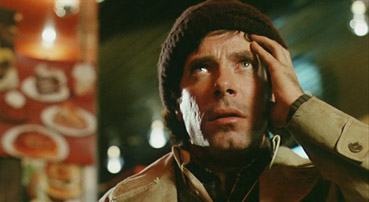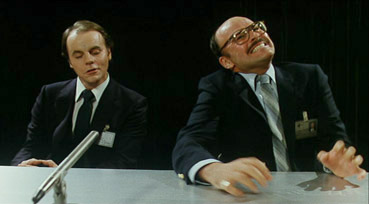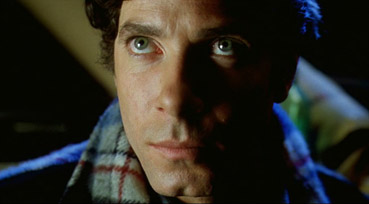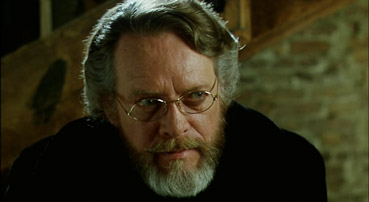| |
Cameron
Vale (attempting a bond with Pearce): "I'm one of you." |
| |
Benjamin
Pearce (wearily cynical): "You're one of me." |
I
distinctly remember when Scanners was
first unleashed on the UK. As someone who had already
been convinced of the unique talent of its director by the stylish low-budget genre works Shivers (1975), Rabid (1977) and The
Brood (1979), I had high hopes
for this one and I was not in any way disappointed.
It had a pace and drive that even its predecessors could
not boast, it had the yuckiest special effects on the
block, but was still very clearly a David Cronenberg
film. It's box-office popularity also saw it reach a wider audience than the director's previous movies, whose success was driven primarily by cult power. One of my work colleagues of the time, who
had refused to have anything to do with The
Brood, was memorably delighted – "I was
trying to scan the usherettes on the way out,"
he enthusiastically told me. Yeah, well, we all tried
it once or twice on somebody. Just occasionally, I still
do.
At
the time, British SF cinema and TV magazine Starburst compared
the film unfavourably to Brian De Palma's The
Fury, which also dealt with destructive telekinetic
powers and secret agencies. I disagreed with them then
and have continued to do so, and whereas Cronenberg
has developed as a true film artist, De Palma's subsequent output
has proved uneven to say the least, with materful works like Scarface, Carlito's Way and The Untouchables sharing ouvre space with the catastrophic Bonfire of the Vanities and the near-hysterical Snake Eyes. The elevation of Cronenberg to his present (and deserved)
status as a creator of challenging and thoughtful cinema also prompts some reviewers to get retrospectively
sniffy about his earlier work. Which is, of course,
the sort of reaction these films were subjected on their release by a critical establishment for whom the very term 'horror
film' was a put-down applied to an entire genre they
believed was beneath them. Cronenberg fans – and there
a fair number of them even then – knew better.

If
you've even a passing interest in this singular director's work then you
should already know what the film is about, but for newcomers here's a brief plot summary. Down-and-out
drifter Cameron Vale is grabbed by agents working for the conglomerate
ConSec after he causes a woman to have a heart attack
through the power of is own thought. He finds himself under the care and tutorage of Dr. Paul Ruth, who informs Vale that he is a
Scanner, a name given to individuals who for apparently unknown reasons have developed
telekinetic abilities. Ruth introduces Vale to Ephemarol, a drug that
suppresses his telekenetic powers and the constant
chatter of other people's voices in his head. Elsewhere in the company, ConSec have decided to demonstrate the abilities of
another Scanner to a specially selected group of specialist outsiders. Unknown to them, the audience
member who volunteers to be scanned is a man named Darryl
Revok, a Scanner of considerable power who uses
his own abilities to reverse the demonstration and kill ConSec's man. Ruth sets
about convincing Vale of the danger represented by Revok
and his underground group, and asks for his help to hunt Revok down.
It's an
intriguing premise given extra bite when the story
dots are joined and enriched by the social, medical and intellectual subtext, which ranges from the Thalidomide drug scandal
of the early 1960s to Jung's theories regarding the duality of man. There's even a sequence involving the telepathic hacking of a computer via a telephone line that prefigures the present-day structure and workings of the internet. Yes, there are a number of story holes
and inconsistencies – Vale is sinking under the noise
of other people's thoughts one minute and seemingly
oblivious to them the next, and more than once he
and fellow Scanner Kim Obrist are snuck up on by aggressors who conveniently announce their presence by loudly cocking
a pump-action shotgun – but this is almost nit-picking
given how slickly the story is developed and how smartly individual scenes are handled. The opener, for example,
contains no explanatory dialogue, yet through canny
camera placement and a superb use of sound, Cronenberg
makes it clear not only that Vale has induced
a heart attack through the power of thought, but that
he is not in anything like full control of this
ability. This audio-visual approach is followed through in the scene that follows, as Vale, tied to
a bed like a drying-out junkie, has his head invaded
by the increasingly oppressive chatter of the thoughts
of a group of verbally silent onlookers.
The most famous sequence remains Revok's assasination of ConSec's Scanner, causing the man's head to explode in a jaw-droppingly convincing physical effect.
Cronenberg may seem to confound genre logic by having
it happen so early in the film rather than saving it for
the climax (something De Palma did with the exploding John
Cassavetes in The Fury), but its narrative
positioning is crucial here, as from this moment on, every
time a scan is initiated we are only too well aware of the lethal direction it could take. Cronenberg never repeats the
trick, however, instead exploring a number of variations on the theme, the
most unexpectedly effective of which sees a security
guard forced to relive a traumatic but unspecified memory of his
mother that leaves him in a state of emotional distress.
The final Scanner dual may be driven by prosthetic effects,
but they are at least good prosthetics (courtesy of
the brilliant Dick Smith), and accompanied as they are by Howard
Shore's doom-soaked score, the scene has a sense of almost apocalyptic sadness that is typical of Cronenberg's early work,
and concludes in a manner that is open to at least three
possible interpretations.

Performance
wise, Scanners marked the last of the
iffy male leads that were always the weak point in the
director's earlier films, which was to end
sharply with James Woods and Videodrome.
Stephen Lack was apparently cast for his penetrating
eyes and they really are something, most convincingly selling the idea of physical power unleashed through
the force of the mind, but asked to deliver dialogue he is devoid of emotion or any real inflection. But
once again help is at hand in the supporting cast.
Where The Brood had Oliver Reed and
Samantha Eggar, Scanners has Patrick
McGoohan and Michael Ironside. Despite constant arguments
with the director over the character and script changes
(Cronenberg admits he was writing it as he went along),
McGoohan is at his low-key best here, pressed
down by the weight of corporate judgment and his own
past mistakes but finding new hope in his talented young protegé.
But as the powerful and dangerous Revok, Michael Ironside
effectively steals the film, from the authorotative menace of his vocal delivery to his facial contortions
when scanning his victims, a disturbingly convincing mixture of malicious
intent, physical struggle and sadistic satisfaction. It's a
marvelous turn that set the actor on a career that was
to be littered with memorable tough guy roles, and remains one
of his most enjoyable and impressive performances. It
should be noted that Scanners was the
film that really brought Ironside to prominence and would thus not have raised 1981 audience eyebrows when he cautiously
volunteers to take part in the scanner demonstration. Cronenberg
regulars will also delight in another memorably eccentric performance from regular bit player
Robert Silverman as cynical Scanner artist Benjamin Pierce.
Although
more populist elements are incorporated into the
action – shop windows are driven through, shotguns are blasted, and cars, gas stations and
computers loudly explode – and the editing pace is sometimes up at
action movie speed, the rest is Cronenberg to the core.
Occasionally he does stumble, as in the attempt to show a positive side of scanning as a sort of communal
telepathic meditation, which is jarringly clunky in its literal
description of the shared thoughts (especially when
you consider how effectively suggestion is used elsewhere),
and the abrupt later arrival of a thoughts voice-over
for Paul Ruth smacks of hurried plot-clearing. But for
the rest of the time the director is flying, exploring favourite
themes with an energy and storytelling drive that has
prevented the film from seriously dating, despite the
occasionally outdated technology on display. Sound in
particular is employed to arresting effect, the scans building
in intensity through a combination of powered bass notes,
electronic growls and rising whines, the mental condition of
those who survive the attacks vividly suggested through
the garbled remains of their audible thoughts. So flawed
it may be, but Scanners remains a terrific
horror/sf crossover, and an essential slice of Cronenberg
cinematic meat.
Oh
joy. Taking a leaf from MGM's region 1 release of The
Brood, Anchor Bay have delivered an anamorphic
1.78:1 transfer that is frankly as good as the film
has ever looked on home video. The contrast is a
tad harsh in places, but on the whole this
is a very nice job, with sharpness, colour and black
levels all very good indeed. Will someone now do the
same for Rabid and Shivers?

There
are three soundtracks available here – Dolby 2.0 stereo,
5.1 and DTS. Though the stereo track may be closest
to the original release, the 5.1 and DTS mixes are actually
rather good – although there is little in the way of
surround sound, the increased clarity and punch really
deliver in the scanning sequences. Both tracks do, however, emphasise
a slight hiss beneath the dialogue, which is presumably
down to the original recording and mix. Some of the dialogue
is a tad aggressive in its volume on the DTS track, and moments
of high-pitched sound and music can be a little shrill.
Otherwise, a rather nice job.
The
main extra feature here is The Directors:
The Films of David Cronenberg (59:02), a
single programme from Robert J. Emery's 1999 US TV series
on noted movie directors. Built around an extended interview
with the always fascinating Cronenberg, it includes a
few words from some of the actors he has worked with,
Michael Ironside included. Possibly most enthusiastic
of all is Holly Hunter, who is very positive about Crash and her role in it, which should get up the nose of Daily Mail feature writers. Narrated in a voice that reminded me of Biography
Channel documentaries and backed by tinkly music, this
is a reasonably detailed overview of Cronenberg's film
career, although Fast Company, The
Brood and M. Butterfly are skipped
over with barely a nod. The programme is framed in its
original 4:3 aspect ratio, and the sound stereo 2.0. It should
be noted that this same documentary is also set to appear
on Anchor Bay's region 2 release of The Brood.
Inside
Scan: Scanners (8:28) is a short but informative
overview of the film by horror journalist Alan Jones (who
used to write for Starburst, as it happens).
It contains some spoilers, but thoughtfully announces
this at the start, so should be watched after the film.
There
are 3 Trailers, one each for Scanners, Scanners II – The New
Order and Scanners III – The Takeover.
If you haven't seen the tawdry sequels and don't have
the three-film box set (and I don't, thank you very much),
the second and third provide a brief glimpse at what lesser
talents did with Cronenberg's baby. The trailer for Scanners (2:12) is an edited lift of the head exploding sequence.
All of the trailers are 4:3.

The
Brood Trailer (2:47) is there to remind
you of Anchor Bay's other new Cronenberg release. It's
4:3, in less than sparkling shape, but is intriguingly
put together, despite the voice-over.
Film
Notes provide brief background information
on the film in white text against a could-be-clearer background.
They do provide warning of the threatened remake, though.
There
are brief but succinct Biographies of Cronenberg and actors Jennifer O'Neil, Patrick McGoohan
and Michael Ironside.
Stills features 18 publicity photos, 2 posters and the cover
of the press pack (I have that somewhere). All are reproduced
at a decent size.
Scanners is classic early Cronenberg, a smart, tightly paced
and visceral slice of mind-and-body horror that has stood
the test of time well, and survives Stephen Lack's unanimated
delivery and a few plot hiccups caused by on-the-fly scriptwriting
by way of Cronenberg's handling and some very fine work from the
supporting players. Anchor Bay's new region 2 release
delivers on the picture and sound quality and on a couple
of good extras, but this still cries out for a Cronenberg
commentary. Until a full blown special edition appears,
though, this will do nicely.
|